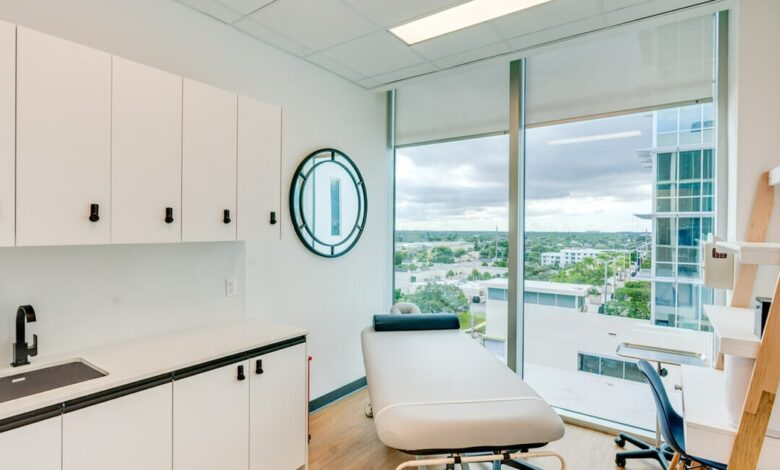How medical coworking could help keep physicians independent

Medical coworking is gaining traction among physicians who want to stay independent in a rapidly consolidating industry.
Coworking companies that manage the spaces often provide front-desk staff and standard exam room furniture for tenants, but the physicians are responsible for supplying any specialized equipment or products they may need. Many companies also offer business management tools and cleaning services.
Leaders at coworking companies say their model could help keep independent practice providers in business by lowering overhead costs and increasing networking opportunities, while still allowing doctors autonomy. The framework isn’t without its limitations, however.
What’s the appeal?
Coworking business owners and some physicians say medical coworking could help bolster the shrinking independent doctor landscape. An American Medical Association report released in July found that fewer physicians own practices—44% in 2022 versus 53.2% a decade ago. Women are even less likely to own practices: Last year, 35.7% of women physicians were owners, compared with 48.6% of men, the report found.
Dr. Stacey Bartell, medical director for career and practice at the American Academy of Family Physicians, said doctors could turn to independent practice in a coworking space for multiple reasons, particularly in the wake of the COVID-19 public health emergency.
“We know that there’s a short-staffing component right now in medicine like we’ve never seen before,” Bartell said. “As you look at short-staffing, as you look at an increase in virtual care post-pandemic … if you were to co-locate with other practices, you could reduce the overhead costs of your practice, [and] at the same time, share staff and other services, which would allow promotion of independent practice and maintaining independent practice.”
Coworking companies said clients can avoid potentially long-term, inflexible lease agreements and choose what hours they want to work without pouring their own resources into setting up an office, especially if they practice in multiple locations each week. Prices vary widely, ranging from the low hundreds to thousands of dollars a month depending on the agreement.
Dr. Rahul Patel, an independent podiatrist, has an agreement with medical coworking company Lina to practice out of one room a few days a week. He said networking opportunities and bouncing ideas off other practitioners are some of the most rewarding aspects of the coworking model.
“‘You need a physical therapist? Let me come walk you over to see if she’s available,’ and then just bring the patient right there and they can have the conversation … to book an appointment with that other practitioner,” Patel said.
Traditional coworking spaces, which are often geared toward entrepreneurs and startup technology companies, generally don’t have the proper infrastructure for a medical setting, said Rachel Puri, CEO of Lina. Puri and her husband launched the company in 2017, combining his experience in real estate development with her nursing background.
Lina works with more than 200 members, including primary care physicians and dermatologists. It has two coworking offices in New York and one in South Florida.
“We feel like right now in this post-COVID world that we live in, we are really at the cusp of transformation in terms of real estate and healthcare, and those are the two industries that are known to be slow to evolve and modernize,” Puri said.
Dr. Charles Pereyra, founder of wellness and regenerative medicine center Springs Rejuvenation, has an office in two of Lina’s locations, in addition to a few other offices he independently set up. He said coworking allowed him to open offices more quickly to meet growing patient demand.
Bartell noted medical coworking could lead to better access to care in rural areas, as clinicians would experience fewer barriers in bringing their services to underserved populations. Having a network of services in one place, with flexible contract agreements, could cut down on patients’ transportation issues and allow physicians to quickly refer them to colleagues. That ultimately results in better care coordination, she said.
Still a novel idea
Medical coworking is still a novel idea among many clinicians, and there aren’t enough coworking options available from which to choose, Puri said.
Pereyra said a lot of physicians simply don’t know about the model. The opportunity to cowork through Lina “just kind of fell in my lap,” he said.
Geographic location, including where coworking spaces are available, plays a big role in where physicians practice medicine, Bartell said. Older independent clinicians would be less likely to move an established practice to a shared space, she said.
At the same time, younger physicians who may be more open to coworking may feel more secure in an employed position, she added.
Physicians may also prefer to to join medical groups or health systems to avoid the complexities and time commitment involved with running their own business, coworking executives say.
Securing space is only one aspect of the equation.
“Coworking by itself is not going to solve the problem [of managing an independent practice] … because who’s going to operate the clinic?” said Arun Mallikarjunan, CEO at the medical coworking company Symbiosis.
The doctor “can find [their] own digital marketing guy, but the problem that the doctor is still going to face is, who’s going to manage these people? Who’s going to make sure that they’re doing what they’re supposed to be doing?” he said.
Symbiosis, which has two offices in the Washington metro area, offers a “practice in a box” package that also includes billing and revenue help, digital marketing, accounting and other resources, depending on the client’s needs.
Carehub Coworking, which has a location in Austin, Texas, and is building an office in the Pittsburgh area, also provides options beyond renting space. Launched in 2019, Carehub offers clients a cloud-based software app to manage its coworking locations, including insight on which doctors occupy what spaces and when, plus a check-in component for patients, CEO Lee Jackson said.
To appeal to more clients, Carehub’s location in Pittsburgh will be an “integrated outpatient healthcare facility,” a hybrid option that offers traditional medical office agreements and part-time, flexible coworking space, Jackson said. He declined to share the number of Carehub members, but said expansion plans are underway.




